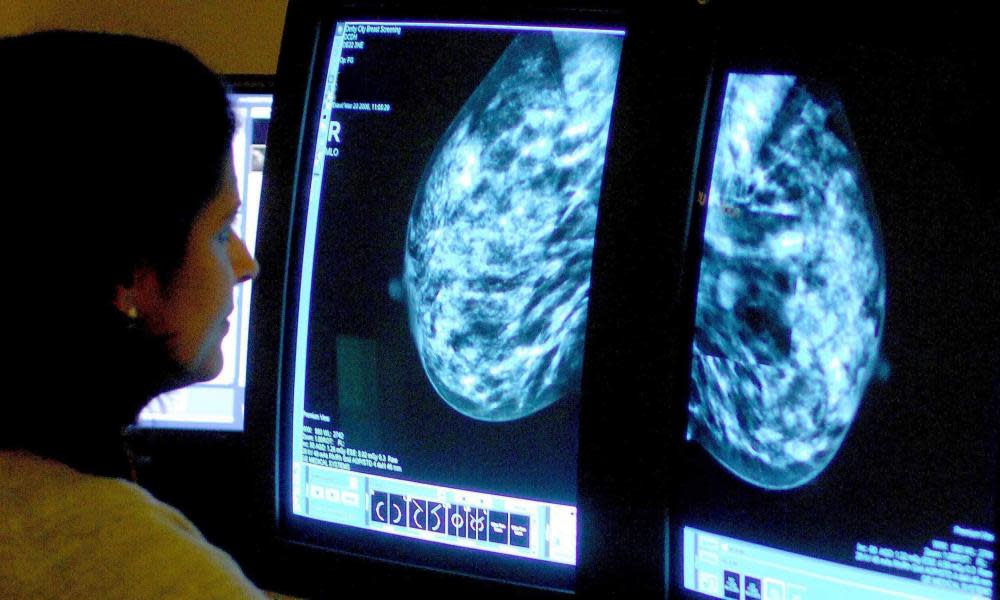Revealed: 100,000 wait more than two weeks to see cancer specialist

More than 100,000 patients a year are “having their worst fears dragged out” by having to wait longer than the stated maximum of two weeks to see a cancer specialist to find out if they have the disease, new NHS figures obtained by the Guardian reveal.
A total of 102,697 people in England did not get to see a consultant within 14 days of being urgently referred by their GP last year – a key patient right in the NHS constitution. Some 25,153 people had to wait more than the official target of 62 days to start their treatment.
Macmillan Cancer Support said growing delays to see a specialist, have a diagnostic test and start treatment meant that “thousands of people are being left in an appalling state of limbo”. The Royal College of Radiologists said it feared that long waits beyond the supposed maximums may also reduce patients’ chances of survival and risk some cancers becoming untreatable.
The findings are contained in an analysis of cancer waiting times performance in 2016 undertaken by the House of Commons Library at the request of the shadow health secretary, John Ashworth. “These statistics should be a badge of shame for Theresa May. It’s a national disgrace that this Tory government’s sustained failure to properly fund cancer services has left thousands of patients waiting longer than expected for treatment they urgently need,” he said.
Dr Nicola Strickland, the president of the Royal College of Radiologists, said: “Any delay in diagnosis or time to start therapy risks a growth in the cancer, potentially making it incurable. These delays increase the anxiety experienced by patients and their relatives at this difficult time.”
Diagnostic services’ difficulty in meeting demand means that 230,000 patients a year are also waiting more than a month for the results of X-rays and CT and MRI scans, she said. NHS cancer services are hobbled by chronic shortages of radiologists and clinical oncologists, she said.
The Commons research also breaks down the month-by-month performance by about 150 NHS hospital trusts and several private sector organisations which provide NHS-funded cancer services against the three main cancer targets. They specify that 93% of patients must see a specialist within 14 days of being referred for suspected cancer, 96% should have their first treatment inside 31 days and that 85% of those feared to have a new primary cancer should start treatment within 62 days.
“These targets exist for a reason. If cancers are caught early, survival rates improve. Behind every single one of these figures is a family having their worst fears dragged out for even longer,” said Dr Ann McMahon, the professional adviser to the Royal College of Nursing and Breast Care Nursing Forum.
The analysis shows that 25 out of 157 providers, almost one in six, failed to ensure that the required 93% of patients urgently referred by their GP last year saw a specialist within 14 days. The troubled Worcestershire Royal Acute Hospitals NHS trust recorded both the worst monthly performance – seeing just 39.4% of patients – and also the worst overall performance across the year against that standard, with only 74% of patients seen on time.
It provided 13,100 people with an appointment with a specialist within 14 days, but it failed to do so with 4,605 other patients, by far the largest number of any hospital trust or private firm. The Shrewsbury trust has been involved in controversy recently after two patients died in early January during the NHS’s worst winter crisis in years, reportedly after long waits on trolleys to get a bed. The Care Quality Commission said that month that safety standards were inadequate.
FEighty-six of of all 155 providers, or 55%, breached the 62-day target.
“A cancer diagnosis is a devastating, life-changing moment in many people’s lives. Every cancer patient should be given the comfort of knowing they were diagnosed and treated as quickly as possible, but as these data show, thousands of people are being left in an appalling state of limbo each year,” said Moira Fraser, Macmillan’s director of policy, public affairs and campaigns.
“Extended waits to start treatment can have a serious impact on someone’s mental wellbeing and we are concerned may ultimately harm someone’s long-term health outcomes.
“Unless you have been through it, it is impossible to imagine the stress and uncertainty of waiting for treatment, treatment you know could be the only chance for you or a loved one. We are seeing more and more referrals, which is to be welcomed, but investment in cancer services has not been keeping pace,” McMahon said.
A spokesman for the Department of Health said: “Cancer survival rates are actually now at a record high, and the NHS treated over 110,000 patients – 82% - within the target of 62 days last year, as the NHS rises to the challenge of an increase in urgent referrals for suspected cancer of over 90% compared to 2009/10.
“To build on this progress we have announced up to £300m a year to meet our new target for patients to be given a definitive diagnosis, or the all-clear, within 28 days of a GP referral.”

 Yahoo News
Yahoo News 
